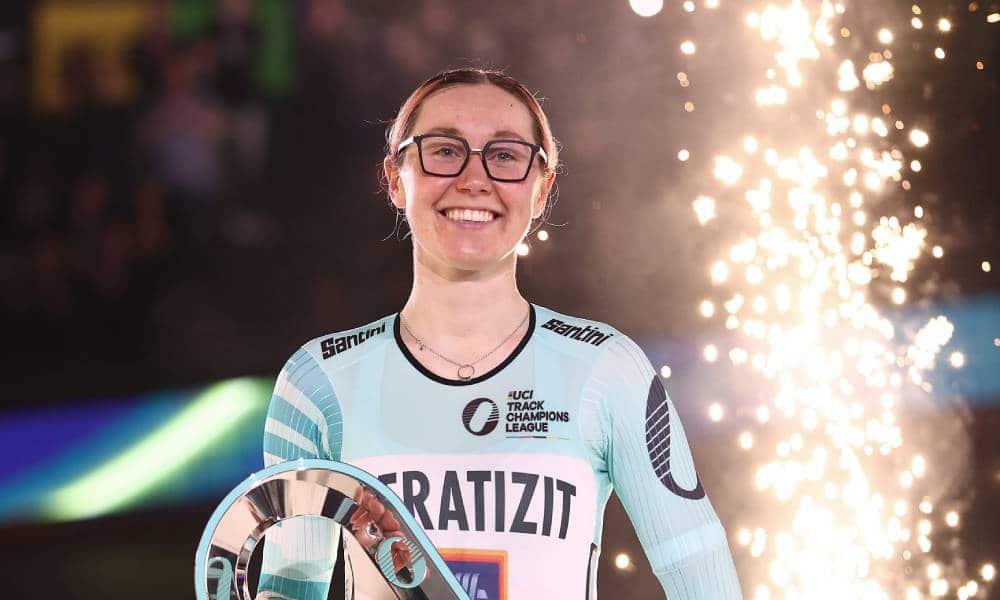British cyclist Katie Archibald says that trans athletes have been “let down” by sporting bodies’ inclusion policies. (Getty/Sebastian Frej/MB Media)
Olympic gold medalist Katie Archibald has declared that trans athletes have been “let down” by inclusion policies in the sporting world.
Archibald, who is a two-time Olympic cycling champion, called out “international governing bodies of several sports” for failing trans athletes – particularly trans women – with their policies, the BBC reported.
“These policies have put the athletes, their involvement in sport, and their personal lives under intense scrutiny when all the athletes have done is follow the rules and enter a category they were encouraged to enter,” Archibald said.
“I, too, feel let down by these policies.”
Katie Archibald condemned the Union Cycliste Internationale (UCI) – cycling’s world governing body – for making trans cyclist Emily Bridges the centre of the debate on trans athletes’ ability to participate in women’s events.
She said the UCI “chose to delay action” on its trans inclusion policy until Bridges was about to participate in the women’s events at the British National Omnium Championships. Just days before the event, the UCI ruled that Bridges could not compete “under their current guidelines”.
Archibald said the move made the debate “sadly personal for one rider” and ultimately “wasn’t fair”.
“I have the utmost respect for transgender people and equally respect their right to fair and safe inclusion in sport,” Archibald said.
She continued: “Global sports bodies, instead of doing the work to create a welcoming and inclusive environment in a category where fairness could be ensured, have put the personal lives of these athletes on to the pages of tabloid newspapers.
“It’s not right and we can’t continue this way.”
She then went on to call for trans athletes to be welcomed in “our clubs, our training sessions and our races” – but she said this shouldn’t come at the expense of “fairness” in sport.
Katie Archibald said: “I feel let down by the International Olympic Committee [IOC] who tell me there should be no assumed advantage for an athlete with a gender identity different to their sex.
“I read this and hear that my world titles, my Olympic medals, and the champions jerseys I have at home, were all won in a category of people who simply don’t try as hard as the men.
“That losing to male androgenisation is not about biology, but mindset. They are wrong.
“The retained advantage of people who have gone through male puberty in strength, stamina, and physique, with or without testosterone suppression, has been well documented.”
Last year, the IOC announced that it would be dropping its trans athlete policy which centred around setting limits on the testosterone levels for female athletes.
After extensive research, the IOC said that total testosterone levels are no longer considered to be the most important factor in determining whether trans women should be allowed to compete.
Instead, from March 2022, the IOC said that individual sports will set their own rules around trans inclusion.
IOC medical and scientific director Richard Budgett told OutSports that the research found it is “perfectly clear” that athletic performance “is not proportional to your endogenous, in-built testosterone”.
Scientists and experts have continuously emphasised that there is no real need to ban trans athletes from sports. Research has found that the role testosterone plays in trans eligibility rules in athletics is often exaggerated given that the hormone has little role in performance differences.
Earlier this month, British Cycling suspended its trans and non-binary participation policy, pending a “full review” in the coming weeks.
British Cycling has suspended its trans and non-binary participation policy with immediate effect, promising a “full review” in the coming weeks. The British national governing body said the decision came about because of a difference in licensing policies between British Cycling and the UCI.
British Cycling added that it remains “committed” to ensuring that trans and non-binary cyclists are “welcomed, supports and celebrated” in the sport.
Aftering being prevented from competing earlier this month, Bridges said she has been “relentlessly harassed and demonised” by people who have a “specific agenda to push”. She described how journalists have been to her house “every day” and that her “privacy has been totally violated”.
“They attack anything that isn’t the norm and print whatever is most likely to result in the highest engagement for their articles, and bring in advertising,” she said.
“This is without care for the wellbeing of individuals or marginalised groups, and others are left to pick up the pieces due to their actions.”
